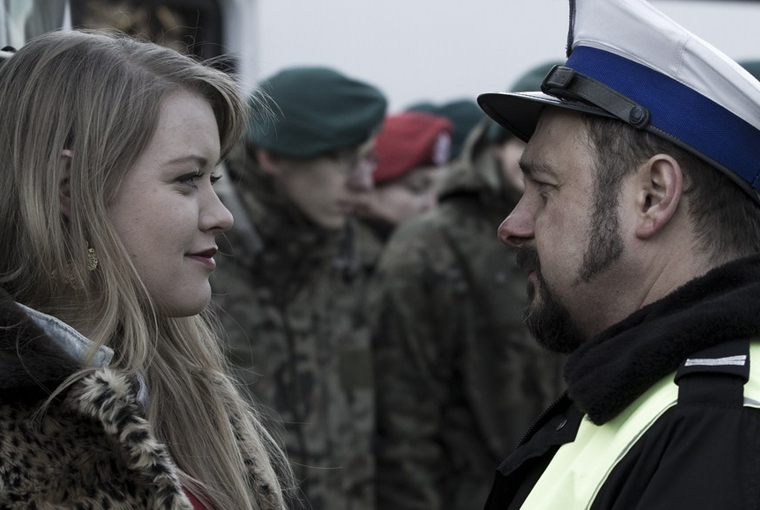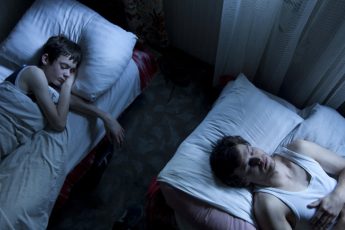Too Little and Too Much
Wojciech Smarzowski’s Traffic Department (Drogówka, 2013)
Vol. 44 (August 2014) by Konstanty Kuzma
In Traffic Department, a police officer learns first-hand what it means to be accused of a wrongdoing. Neither good nor bad, Król is nothing out of the ordinary – both family man and a slave to nightly escapades – until he is charged with murdering a colleague and must prove to us viewers and the state that he is innocent. As one might expect, this endeavor involves diverting some of the blame onto other people of various ranks and standings, which soon leads to the insight that Król is – whether guilty or not – just a pawn in the game.
The police in Traffic Department practices both an obstinate ethical codex and hobbies at odds with its calling, most notably a thirst for partying and sex which is temporarily quenched before, during, or after duty in brothels, bedrooms and police cars. The ability to reconcile such contrasts appears to be an essential skill of the officers, who must enforce law and order in a context rife with corruption. When Król is unable to fine a drunk deputy because of his connections to the police force, our protagonist drives off with the state official’s car keys and leaves him standing in the middle of the street; if rules cannot be exacted, the goodwill of the officers restores some degree (or feeling) of justice – thus the film’s main plot. Unfortunately, the twist of Drogówka is that there is no twist at all: every other cliche of the corrupt but likeable statesman from American cop films is re-instantiated with the typical colors (mostly gray) and features (corruption, low-life, alcohol) of life in Poland’s capital, which happens not to be all that different from life in your ordinary U.S. city.
While Smarzowski’s approach may not be original, the timing is right: a soaring awareness for the precarious reality on Poland’s streets – Prime Minister Donald Tusk has promised strict measures in response – is surely part of the success of Smarzowski at the domestic box-office. Another is his fine craftsmanship, which is able to accommodate comedy and drama in a gripping narrative which entices the viewer towards conflicting intuitions. Still, like the Hollywood flicks against which it competed in Polish movie theaters (beating many of them), Traffic Department has little to offer beyond mild poignancy: if anything, the views of Poles about their country should be reinforced by this piece, the only obvious reservation being its penchant for hyperbole.
In contemporary Polish cinema, there is a strange predilection for stories revealing the injustice and overall corruptibility of society today which stands in stark contrast to both traditional historical movies and what Moritz Pfeifer and I call “memory tales”, i.e. historical movies in which the plot revolves around remembrance (remembering of remembering). In films of the latter type, the ultimate responsibility for the depicted misdeeds lies with a foreign force, most typically Nazis or Soviets. Thus, when we follow the moral wakening of a Pole (e.g. In Darkness), we are likely to follow his struggle to overcome the economic, moral and political order enforced by a local or regional power. When, on the other hand, a protagonist in modern Polish society is fighting injustice (e.g. Traffic Department), he is fighting a domestic and more organic form of systemic injustice which figures inherently unbeatable – if you overcome your peers, your elders will eat you and vice versa. On the surface, these two depictions may bear resemblances, but crucially historical films explain struggles that contemporary films only describe: the dogmatic tone with which history is taught is foreign to the telling of contemporary stories.
True, this may reflect the way ordinary Poles perceive past and present. But it also means that Polish directors sometimes refrain from drawing the causal connections which their historical films are over-abundant with. If filmmakers seek the type of one-line-explanations for contemporary Poland they employ to describe Poland’s past, they are right to refrain from explaining (If we cannot explain everything, we must explain nothing). But it is worth asking whether simple-minded explanations are worthy companions at all. Rather than asking whether Poles are guilty, we should inquire which of them are and why. Films should not explain the world, but aspects of it – a truth which could help Polish filmmakers both make their historical films less simplistic, and their contemporary films more complex.




Leave a Comment